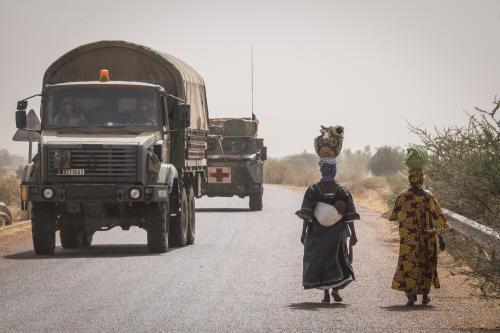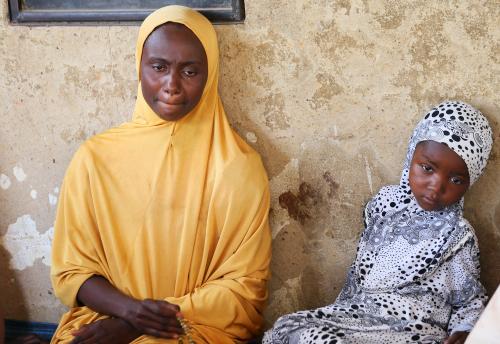Pakistan’s General-President, Pervez Musharraf, is now publicly talking with important civilian politicians, notably former prime minister Benazir Bhutto. Despite past allegations of corruption, Ms. Bhutto is widely seen in the West as the most secular, forward-looking Pakistani politician, who commands the loyalty of the country’s largest political party, the Pakistan People’s Party. Her opposition to extremism, and her commitment to civil liberties and a free press, raise hopes that a deal between the general and Ms. Bhutto, could help beat back Islamic extremism, move Pakistan to the column of fully democratic states, and establish a normal balance between civil and military authority.
This is wishful thinking. If Ms. Bhutto does return to office, she will not return to full power. A deal between her and Gen. Musharraf would be no more than the most pragmatic stop-gap arrangement available to the President at this time. Even if Ms. Bhutto were to manage to oust him from office, such a development would say little about Pakistan’s return to democracy.
The Pakistan army’s pre-eminent political role (the other services are irrelevant) derives from structural and attitudinal anomalies. Gen. Musharraf, like many, but not all, of his colleagues, has contempt for all civilian politicians, even those, such as the Islamist MMA (the Muttahida Majlis-e-Amal) or the prominent and corrupt Choudhury family, whom he has co-opted. This contempt stems from the belief (held by many military people around the world) that those who engage in politics are inherently untrustworthy. In this view, Pakistan’s politicians are corruptible and self-seeking, and thus must be kept away from critical national security decisions for fear that they will sell out to India or neglect Pakistan’s natural strategic role in Afghanistan.
Thus, Pakistan’s domestic civil-military balance is, in large part, driven by the socialization of its officer corps and its foreign policy – factors that will not soon change.
A return to genuine democracy in Pakistan is a long-term process that will be achieved through sustained civil-military dialogue (as opposed to deals), which, while being frustrating, may bring the two enclaves to some rough consensus about their respective roles. In that regard, Ms. Bhutto’s propensity to get out of the political alliance that was seeking to pose a united front to a sitting military ruler is actually a step backward.
An all-out push for the immediate return of liberal democracy through totally free elections should not be the foremost priority for now. More important in the short term is to ensure Pakistan’s maximum co-operation in the battle on extremism, both within Pakistan and in Pakistan’s neighbours (often abetted by forces based in Pakistan). Ms. Bhutto’s return could present a tricky situation in this regard. That Ms. Bhutto would persist with a pro-Western tilt is a given. However, the extent to which this will translate into active support on the ground would be determined by the behaviour of the military.
There are two quite disparate scenarios. On the one hand, the military establishment is already irked by the significant number of casualties it has had to take, and it understands that imposing a purely military solution is likely to increase the toll multifold. Past attempts at brokering a peace deal with militants in the Federally Administered Tribal Areas adjacent to Afghanistan were a manifestation of the army’s desire to reduce its losses. With a civilian government (with or without Gen. Musharraf’s presence as president), the army might resist efforts to revive an aggressive military campaign.
This is not to say that Pakistan will not continue to co-operate with Washington, as the army knows that completely ignoring the U.S. agenda could have dire repercussions for Pakistan. However, it believes, correctly, that the army might reduce its effort on the ground, while doing only enough to appease the Americans.
However, another scenario (less likely, perhaps) could come out of a strategic shift in the military’s thinking on the extremist threat. The recent Red Mosque incident and the attacks on army personnel may well have brought home the realization that the extremists are no longer manageable. If so, the military will find useful the presence of a civilian leader to take the heat for a ruthless campaign, blaming her (or him) for army casualties and civilian collateral damage. While this is undoubtedly more attuned with the Western objectives, it is also the option that has much higher political and social costs for Pakistan itself.
Pakistan’s apparent slide toward extremism must be accurately calibrated. The current wave of violence is due to extremist backlash in response to Gen. Musharraf’s belated assault on the Red Mosque. If there is a genuine and more far-ranging crackdown, then violence will increase.
While crude, tribal-based Talibanization is at best a distant prospect, Pakistan also faces a greater long-term threat. If secular political governments continue to fail to deliver economic reforms that affect the society at large (not just the booming urban enclaves), and if the socially reactionary policies introduced by past leaders are not rolled back, a growing population of disgruntled youth with little access to economic opportunities could then support a tunnelled, radical vision of Pakistan. They would provide the manpower for a new wave of Islamist political movements. Fortunately, there is as yet no sign of such a development, but it is inevitable should the liberal elements of Pakistan’s tattered political and social fabric continue to fray.
Western policies toward Pakistan need to distinguish immediate objectives from long-term goals. In the short run, the United States will have to remain engaged with any leadership that takes over Pakistan.
Simultaneously, it should maintain active contacts with the top military brass in order to ensure support on the tactical front. The most effective means to pressure the Pakistanis to deliver more is to attach conditions to military aid. A credible threat of reducing such aid may produce greater co-operation.
The economic and social sector aid to Pakistan is a different matter, and affects Pakistan’s long-term prospects. This should continue at enhanced levels, but must be monitored to ensure that it actually reaches the people of Pakistan.



Commentary
Op-edPakistan, Wishing on a Star
August 4, 2007